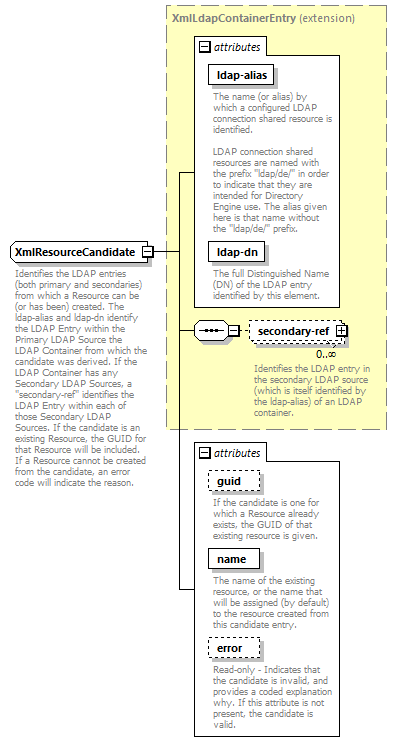| diagram |  |
||||||||||||||||||||||||||||||||||||||||||||||
| namespace | http://base.api.de.bpm.tibco.com | ||||||||||||||||||||||||||||||||||||||||||||||
| type | extension of XmlLdapContainerEntry | ||||||||||||||||||||||||||||||||||||||||||||||
| properties |
|
||||||||||||||||||||||||||||||||||||||||||||||
| children | secondary-ref | ||||||||||||||||||||||||||||||||||||||||||||||
| attributes |
|
||||||||||||||||||||||||||||||||||||||||||||||
| annotation |
|
||||||||||||||||||||||||||||||||||||||||||||||
| source | <xs:complexType name="XmlResourceCandidate"> <xs:annotation> <xs:documentation>Identifies the LDAP entries (both primary and secondaries) from which a Resource can be (or has been) created. The ldap-alias and ldap-dn identify the LDAP Entry within the Primary LDAP Source the LDAP Container from which the candidate was derived. If the LDAP Container has any Secondary LDAP Sources, a "secondary-ref" identifies the LDAP Entry within each of those Secondary LDAP Sources. If the candidate is an existing Resource, the GUID for that Resource will be included. If a Resource cannot be created from the candidate, an error code will indicate the reason.</xs:documentation> </xs:annotation> <xs:complexContent> <xs:extension base="XmlLdapContainerEntry"> <xs:attribute name="guid" type="xs:string" use="optional"> <xs:annotation> <xs:documentation>If the candidate is one for which a Resource already exists, the GUID of that existing resource is given.</xs:documentation> </xs:annotation> </xs:attribute> <xs:attribute name="name" type="xs:string" use="required"> <xs:annotation> <xs:documentation>The name of the existing resource, or the name that will be assigned (by default) to the resource created from this candidate entry.</xs:documentation> </xs:annotation> </xs:attribute> <xs:attribute name="error" type="XmlCandidateError" use="optional"> <xs:annotation> <xs:documentation>Read-only - Indicates that the candidate is invalid, and provides a coded explanation why. If this attribute is not present, the candidate is valid.</xs:documentation> </xs:annotation> </xs:attribute> </xs:extension> </xs:complexContent> </xs:complexType> |
attribute XmlResourceCandidate/@guid
| type | xs:string | ||
| properties |
|
||
| annotation |
|
||
| source | <xs:attribute name="guid" type="xs:string" use="optional"> <xs:annotation> <xs:documentation>If the candidate is one for which a Resource already exists, the GUID of that existing resource is given.</xs:documentation> </xs:annotation> </xs:attribute> |
attribute XmlResourceCandidate/@name
| type | xs:string | ||
| properties |
|
||
| annotation |
|
||
| source | <xs:attribute name="name" type="xs:string" use="required"> <xs:annotation> <xs:documentation>The name of the existing resource, or the name that will be assigned (by default) to the resource created from this candidate entry.</xs:documentation> </xs:annotation> </xs:attribute> |
attribute XmlResourceCandidate/@error
| type | XmlCandidateError | ||||||||||||
| properties |
|
||||||||||||
| facets |
|
||||||||||||
| annotation |
|
||||||||||||
| source | <xs:attribute name="error" type="XmlCandidateError" use="optional"> <xs:annotation> <xs:documentation>Read-only - Indicates that the candidate is invalid, and provides a coded explanation why. If this attribute is not present, the candidate is valid.</xs:documentation> </xs:annotation> </xs:attribute> |
WSDL documentation generated by XMLSpy WSDL Editor http://www.altova.com/xmlspy